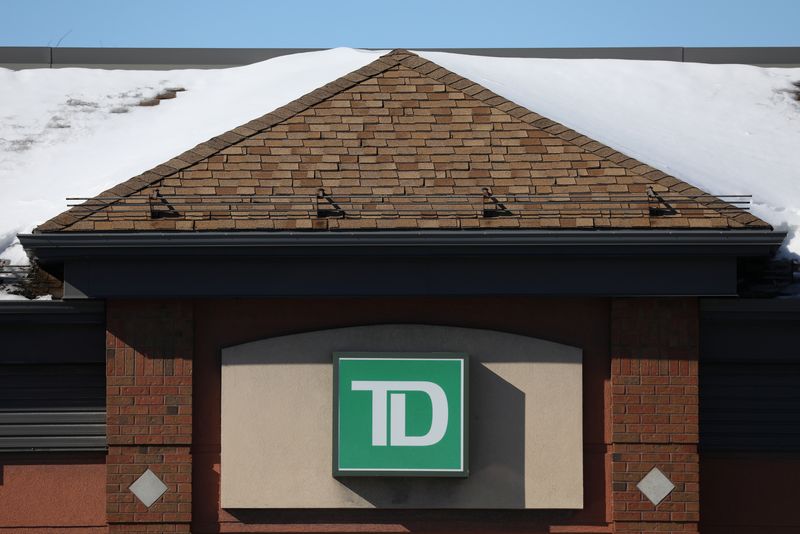TD Bank posts first loss in over two decades after $2.6 billion hit tied to US probe
By Nivedita Balu and Arasu Kannagi Basil
TORONTO (Reuters) -TD Bank on Thursday reported its first loss in over two decades after setting aside an extra $2.6 billion to cover expected fines from U.S. regulators which have been probing weaknesses in Canada's second-largest lender's anti-money laundering (AML) controls.
TD said late Wednesday that it would sell part of its 12.3% stake in U.S. brokerage Charles Schwab (NYSE:SCHW ) to help offset the impact of the fine, for which it had already provisioned $450 million in the prior quarter.
"Although this is a large amount, we remain well- capitalized... I am confident we are doing all the right things to manage through this," TD CEO Bharat Masrani wrote in a memo to staff, seen by Reuters, after reporting quarterly earnings.
The U.S. regulatory probes relate to allegations that Chinese drug traffickers used the bank to launder at least $650 million from 2016 through 2021 and an employee took a bribe to facilitate laundering of drug money.
The bank said it expects to resolve the matter by year end and flagged that regulators could also impose non-monetary restrictions.
Analysts said the disclosures should help provide more clarity for investors over the ultimate cost, timing and impact of the probe, which has been a major overhang for TD's stock.
TD's shares are down 7.7% this year compared with the TSX banking index's 8.2% growth. They were down about 3% in Toronto on Thursday.
At nearly $3 billion, the fines could be one of the biggest ever for a Canadian bank, although Scotiabank analyst Meny Grauman said "the real issue" for the bank will be the non-monetary penalties.
Masrani declined to provide details on what those penalties could be when quizzed by analysts on Thursday's earnings call.
The U.S. has been a key growth market for TD where it has invested billions over the past two decades to acquire smaller regional banks on the east coast, building a network of about 1,100 branches, more than it has across Canada.
Potential U.S. regulatory restrictions could dampen that growth, analysts said. Banks operating under regulatory orders to fix their money laundering controls are usually barred from doing deals and potentially from opening new branches.
National Bank analyst Gabriel Dechaine wrote in a note that regulators could also contemplate the type of asset cap. U.S. regulators in 2018 imposed a cap on Wells Fargo that would restrict loan growth.
"If growth here is restricted, TD could deliver sub-par earnings growth relative to peers over the next several years," Dechaine wrote.
TD first disclosed the probe last year shortly after its $13.4 billion bid to acquire U.S. lender First Horizon (NYSE:FHN ) fell apart.
The bank said in May it had spent $500 million to tighten its AML program and risk controls, hired several key executives and invested in staff training programs.
"But there's still much work ahead ... this is a priority. The U.S. business is an important part of the bank and of our future," Masrani told analysts.
"The failures were serious. We own it," he said.
In Canada, TD's personal and commercial banking recorded a 13% rise in net income driven by new account openings and volume growth. TD's wealth management and insurance earnings were flat, reflecting impact from severe weather events.
The net loss was C$181 million, or 14 Canadian cents per share, in the three months ended July 31, compared with a profit of C$2.88 billion, or C$1.53 per share, a year earlier.
On an adjusted basis, TD earned C$2.05 ($1.51) per share, 2 Canadian cents short of analysts' estimates, according to LSEG data.
Provision for credit losses rose to C$1.07 billion, compared with C$766 million a year ago.
The bank's U.S. business, which accounts for about a quarter of TD's profit, reported a 5.6% fall in net income hurt by lower deposit volumes and loan margins.
($1 = 1.3577 Canadian dollars)
Source: Investing.com
